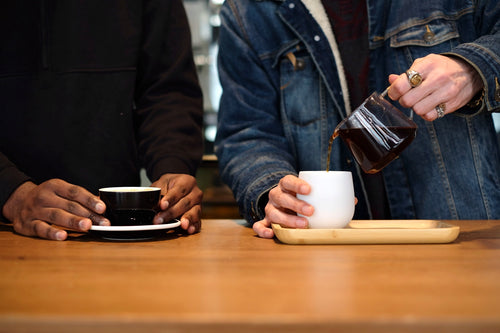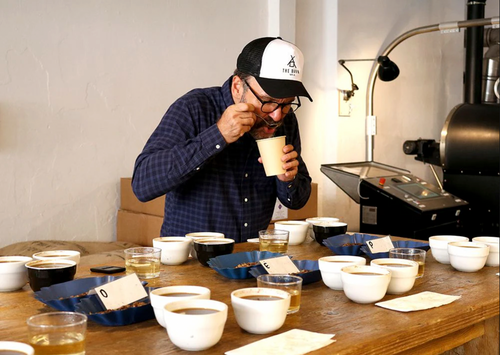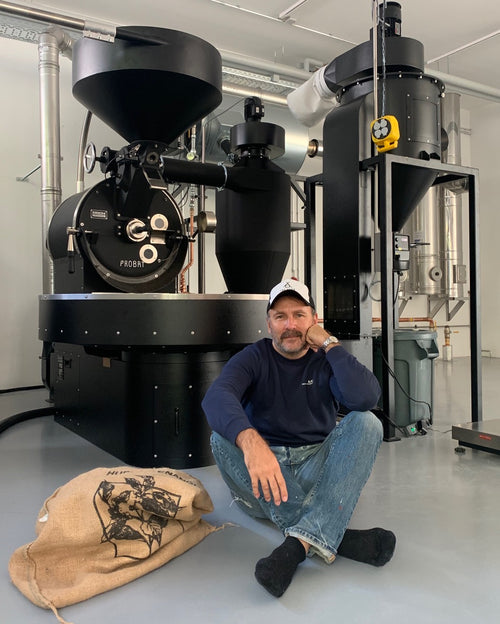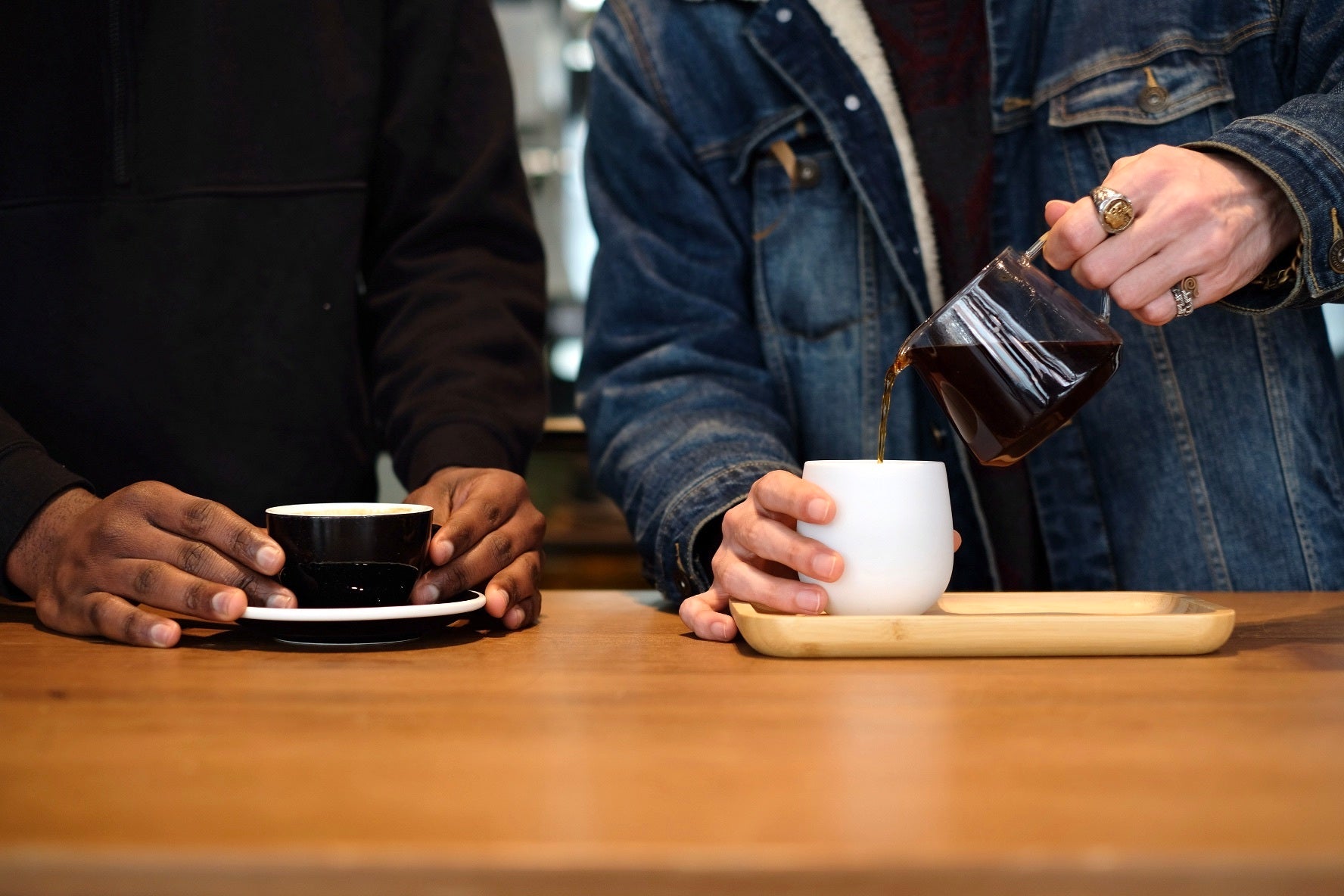BOYCE HARRIES
CHANIA ESTATE, KENYA
During World of Coffee 2019 we were lucky to host some of the producers we work with, thanks to our export partner Belco. One of the producers was Boyce, owner of Chania Estate in Kenya. Boyce's incredible natural processed French Mission varietal was our feature coffee for World of Coffee this year. We took this opportunity to ask him some questions about processing, challenges, and innovations. We have just released Boyce's natural online, click below to get yours - but be quick! It won't be long before it's gone.
What is your favourite processing method and why?
I think in terms of reward it's been our naturals. It's a big risk to take, especially in the Kenyan coffee scene. When I did it, even people within my own organisation were thinking that I would come in and turn everything upside down in a bad way. It's taken a long time to get right, but when you're in this kind of environment (WoC) and you're seeing the kind of reception it's now starting to get, it's really rewarding - to be able to produce a coffee where you know the washed profile more or less, then suddenly take a right angle to it (with the natural processing) and have it come out as a completely different taste experience. I used to be totally uneducated in drinking coffee, I used to put milk and all that kind of stuff in it, so my journey has come such a long way as well. I'm now drinking black coffee, and to have someone who's roasting it in the way Ralf does, and to taste that - I could drink that every day. Of course, I'm biased. You also get used to your own flavour, partly just out of lack of exposure, but partly because you gravitate towards what you're comfortable with.
You mentioned "lack of exposure" - do you have much to do with other coffee producers in Kenya?
Not so much, every now and again. The structure of coffee marketing in Kenya is quite complex. You have to be very proactive to find places where you have the opportunity to taste other farmers' coffees. That's from the producer's perspective - you can be in the coffee trade and be part of the chain where you receive a lot of coffee, you get that exposure. Whereas, for a producer to get up there, the facilitators are very busy and the interest in educating and exposing farmers to that side of things, that isn't something that's come through yet. In fact, the most exposure I've had is when we start interacting with roasters and they visit from overseas and bring samples of coffee, I love that! It might seems strange bringing someone coffee when they're producing it, but it is a real pleasure to have that opportunity to taste different things. I wish we had more exposure to it, it gives you a good idea of where you fit. We had a bit of a joke with one of the producers I met today. I said "oh we're in competition..." and then we just both laughed cause we know we're not. It's just great to taste other profiles from a different part of the world. It must be really nice meeting everyone while you're here for WoC... It is, it's pretty dangerous though because when we start talking we forget that we're there to talk to other people!
What inspired you to start producing Specialty Coffee? Was the estate already growing coffee?
Yeah it was. The background is that on our current property I'm the fourth generation, but the fifth generation of coffee farmers. Our family settled in Kenya in 1904 and bought land, but the current farm we're on already had coffee established. It was the French Mission, and the coffee coming from that was planted before 1926 - so a lot of those trees are 90+ years old. It was a family business, so as I grew up I got more involved. When you're very young you don't realise it, you're just going around the farms. In your late teens you can start working if you want it, which I did, and take on more responsibility. Then I followed some education courses that were a balance between agriculture and business, and I worked elsewhere in horticulture. So coming back into the farm after 6 years working for a multinational organisation, dealing with flowers - I came in after having that experience and my questions to the organisation as it stood were :who are our customers?" "Why are they buying from us?" And "How do we get to know who they are?" That was 15 years ago, and even now I'm still learning every day. It's been a really long journey. Once we started to ask those questions, more doors started to open, and then it's the journey of finding the right people, and then being able to interact and climb over...I don't want to say a wall because it sounds like something that has been put there. It's not that. It's just the way that the industry works, it's very commodity based. And once you ask those questions you realise there's a whole new world of coffee that's actually there - and many growers probably weren't ever aware of it. So that's when you say "right, now there are people that want a certain quality. What is it that they want?" Actually, I started asking them and thats where that idea of naturals came from, someone said "have you ever heard of doing it this way?" and I thought "ooh let's have a go...but in very small quantities". If we have an error, or if we're let down in our market, the avenue left to us is the more open market auction-based system in Kenya. Straight away, that profile is not what they're expecting to experience, so immediately you're penalised. Even if it's a clean profile, it's because of that fruity, fermented flavour. They're just looking for a washed profile.
I've heard because of the climate in Kenya it's really hard to produce naturals there because you don't get enough of a dry season after harvest, is that correct?
Normally, yes. But we're finding it more and more with climate change, that we can only predict within a week or two what the (weather) pattern will be. Our general experience has been that we'll be harvesting as it is raining, so that's where the challenge is for naturals because you do need the dry conditions to get the drying of your cherry - because the skin is still on - to continue. This is also where issues with fungal influences come in and you start to get your off-flavours, so that was a big struggle too.
Is weather the main challenge with producing naturals?
Well another issue was the mindset within the organisation, to convince them to really go along with it. You have an organisation where, when we're in peak production, across both farms we probably have about 200+ people involved - and that's not even including the harvesters, the harvesters will add another 200-300 on top of that. Just within the processing we have our own wet mill/drying station. We don't do the drying mill aspect of it, but we take it up to parchment stage of dry coffee, and then it goes to another dry mill. So within all that you've got to have everyone understanding. The attention to detail is essential. The margin of error, or forgiveness, it's a lot narrower so you really need everyone on the ball. I'm very lucky, we have a very good team. The guy that's responsible for the drying and processing side, he's been in coffee for 30 years. So he knew his stuff, and when I proposed naturals to him, he just said "what are you doing?" I said "look, here's the idea, there is an interest in it and with the way the market is this is probably something that will add some value." He said he's think about it. I showed him the suggestions I'd been given and my ideas, and then after a couple of runs he came back and said "we could do this, or maybe we could change that". So he came around. What really convinced them was having visitors come, and they start seeing people walking around, and there is a language barrier but you try to get a conversation going: "Look, they're here now because of what we've done, what you've done" and then they're more excited.
Aside from naturals, are there any other challenges specific to your region?
When you run an organisation that involves lots of labour you do what you do to be able to cope with that. Of course, a happy labour force makes life easier, so you have to be doing something right for people to come and work for you. Certainly in terms of harvesting, you get a lot of people coming in and out, so there's a challenge there. I don't see that in a negative way, I just see it as a challenge. From a more business side of things, you do sometimes have to sit at your desk and deal with legislation and government and all of that, that does become challenging. And then from a farming perspective, it's the variability in climate that we've been seeing. It doesn't matter what process, it's made the approach to production very challenging. You make a lot of plans in advance, and then you have to be on the ground to be able to adapt and adjust to what is actually happening, rather than just laying down a plan and following it.
Do you think that in the past, with the climate being more regular, you could follow the same plan year after year?
I'm the younger generation, so I'm going to say "of course it was easier back then!" but speak to my uncle and he'll say "Boyce, we used to have it much harder". We talk a lot, and he does say that the variability in weather patterns are very different to what he remembers. He's a great one for looking at statistics, and he has the time to do it, so he can tell us "this has been the driest month since 19...". Our weather records on the farm go back to 1926, so he goes back through the records and it's great to have that knowledge and interest behind you. Some days you wake up thinking "I'm not sure how to handle this puzzle, I wonder if it's happened before?" and you go and ask my uncle, he ran the family farms for 30 odd years, and prior to that he worked with another organisation selling coffee. So, he has years of experience, our wet mill manager has 30+ years, and then I have people on the ground with decades of experience. You pull that all together and have a chat about things, and the solution is there. It is challenging because a lot of the problems are not ones that we've necessarily had before, but we just use that experience to work out the next plan.
Are there any new exciting innovations coming up that you want to share with us?
Hopefully! I say new, but internally we've been working on it for a couple of years. We had an interest in the early experimental lots we did with a barista in Australia Matt Lewin, experimenting with honeys. The concept is to try and take a single varietal and process it three ways, so you can experience the three processes from the same varietal - that's really exciting. When I open the (hypothetical) "book" to the "chapter" on honeys I realise it's not one thing, there's so many different variations. That's quite a big thing to get your head around. What works for us is a golden type of honey, that's what always seems to come through. We'll work slowly and carefully with honeys, but we don't want to take our eye off the naturals. With this kind of exposure it's been brilliant after 8+ years, so we'll keep this up and then we'll gradually build up and learn more about honey processes.












